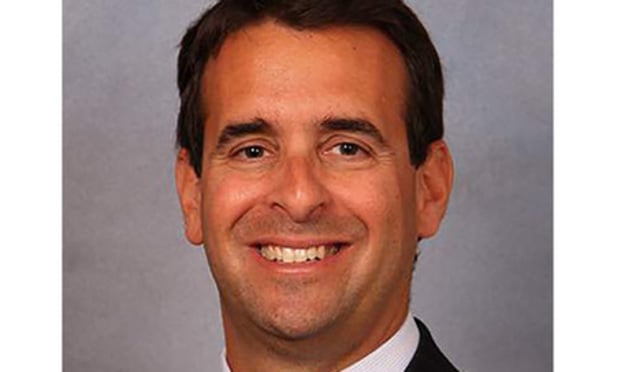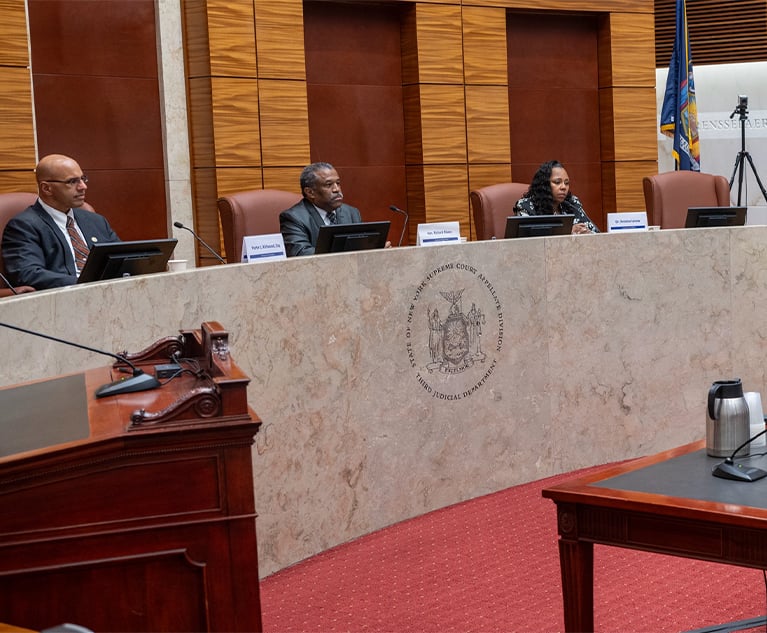Ex-Big Law Partner Gets 18 Months in Prison for Stock Fraud Scheme
Evan Greebel, a former partner at Kaye Scholer and Katten Muchin Rosenman, is headed to prison after working with disgraced pharmaceutical executive Martin Shkreli to defraud investors.
August 17, 2018 at 06:38 PM
6 minute read
 Evan Greebel. Courtesy photo.
Evan Greebel. Courtesy photo.
Rejecting Evan Greebel's defense that he fell victim to “master manipulator” Martin Shkreli, a high-profile former pharmaceutical executive that once controlled a former client, a federal judge sentenced the former Big Law partner to 18 months in prison Friday.
In a hearing that stretched more than three-and-a-half hours, U.S. District Judge Kiyo Matsumoto of the Eastern District of New York said that Greebel, who was a partner at Katten Muchin Rosenman when he represented Shkreli's pharmaceutical company Retrophin Inc., was an experienced and “highly intelligent” attorney who knew what he was getting into when he served as an adviser to Shkreli and his business interests.
“He is not reckless, he was not naive, he was not inexperienced,” Matsumoto said. “He was not led astray by a young, brash CEO.”
Greebel, 45, was practicing at Kaye Scholer at the time of his arrest in December 2015. He was mostly expressionless during the hearing and looking at the table in front of him, though while reading a brief written statement to the court prior to the sentence, he removed his glasses and wiped his eyes.
“I will regret every day of my life, the day I met Martin Shkreli,” he said.
Greebel was convicted last December of conspiracy to commit wire fraud and conspiracy to commit securities fraud when representing Retrophin; he received an 18-month sentence on each count, to run concurrently, and was ordered to pay more than $10.4 million in restitution to the San Diego-based company and forfeit $116,462.
Shkreli himself was found guilty of securities fraud in a separate trial last year and was subsequently sentenced to seven years in prison for his role in the fraud scheme.
Federal prosecutors said Shkreli and Greebel schemed to defraud Retrophin by using its assets to pay off Shkreli's debts to investors in hedge funds he created, MSMB Healthcare and MSMB Capital, through sham settlement and consulting agreements.
Greebel was also accused of working with Shkreli and others to manipulate the price and trading volume of Retrophin's stock.
Greebel's lawyers asked the judge to impose no jail time, arguing that probation was sufficient as he had already lost his law license and a prison sentence would harm his wife and children. His legal team also claimed that Greebel played a “minor” role in the conspiracies.
In arguments prior to the sentencing, Mylan Denerstein, a Gibson, Dunn & Crutcher partner and member of Greebel's defense team, argued that he was punished by the fact that he will likely be disbarred due to his felony convictions.
Gibson Dunn partner Reed Brodsky, a former federal prosecutor in Manhattan who joined the firm five years ago, led the defense team for Greebel, who intends to appeal.
Prosecutors had urged a five-year prison sentence, contending that Greebel “embraced” his relationship with Shkreli and sought to profit from it by earning more at his law firms through his relationship with Shkreli. Prosecutors also claimed that Greebel abused his role as Retrophin's outside lawyer to gain board members' trust.
Assistant U.S. Attorney Alixandra Smith said Friday that the government recommended the sentence to send a message to the legal community about the consequences for an attorney who abuses their position and to “protect the public from corrupt lawyers.”
“The legal community is watching this case very closely,” said Smith, a former associate at Cravath, Swaine & Moore and Jenner & Block. “Leniency would send the wrong message.”
In a strongly worded statement, Richard Donoghue, U.S. attorney for the Eastern District of New York, said that Greebel's sentence “reinforces our message that attorneys who facilitate crimes will be held accountable for their actions.”
“Evan Greebel leveraged his legal training and the trust placed in him by Retrophin's board of directors to commit serious crimes, including the theft of millions of dollars in cash and stock from the very company he was hired to represent. In doing so, Greebel broke the law and violated the ethical duties he owed to his client,” Donoghue said.
In a letter to Matsumoto just two days before his sentencing, Greebel said he wanted to publicly apologize to his family, friends, former colleagues and clients.
“I can never repay the support and loyalty that each of them have shown me during this time. I am as humbled and grateful for it as I am ashamed and embarrassed to stand before them and the court as a convicted man,” Greebel wrote. “From the beginning of this case, it has sickened me that anyone would believe that I would act or conspire to harm a client in order to benefit either myself or anyone else. I am devastated and ashamed by my criminal conviction and this is a burden that I will carry with me for the rest of my life.”
Going forward, Greebel, a native of Scarsdale, New York, said he has been working with others in launching an in-patient drug and rehabilitation facility in the Catskills after seeing that many facilities are located in the West and southwestern regions of the country. He said the new facility will be open by summer or fall 2019.
“I am hopeful that I will be able to begin my future sooner rather than later,” Greebel said.
Just days before his sentencing, Matsumoto, in a 177-page decision, denied Greebel's request for an acquittal or to order a new trial.
“The jury reasonably concluded that Mr. Greebel conspired with Mr. Shkreli and [Retrophin CFO Marc Panoff] to commit wire fraud … by causing Retrophin to enter into the settlement and consulting agreements, with the specific intent of defrauding Retrophin of shares and funds in order to pay off and silence” hedge fund investors and “to protect Mr. Shkreli,” the judge wrote.
This content has been archived. It is available through our partners, LexisNexis® and Bloomberg Law.
To view this content, please continue to their sites.
Not a Lexis Subscriber?
Subscribe Now
Not a Bloomberg Law Subscriber?
Subscribe Now
NOT FOR REPRINT
© 2025 ALM Global, LLC, All Rights Reserved. Request academic re-use from www.copyright.com. All other uses, submit a request to [email protected]. For more information visit Asset & Logo Licensing.
You Might Like
View All

Law Firms Expand Scope of Immigration Expertise Amid Blitz of Trump Orders
6 minute read
'Reluctant to Trust'?: NY Courts Continue to Grapple With Complexities of Jury Diversity
Trending Stories
- 1Uber Files RICO Suit Against Plaintiff-Side Firms Alleging Fraudulent Injury Claims
- 2The Law Firm Disrupted: Scrutinizing the Elephant More Than the Mouse
- 3Inherent Diminished Value Damages Unavailable to 3rd-Party Claimants, Court Says
- 4Pa. Defense Firm Sued by Client Over Ex-Eagles Player's $43.5M Med Mal Win
- 5Losses Mount at Morris Manning, but Departing Ex-Chair Stays Bullish About His Old Firm's Future
Who Got The Work
J. Brugh Lower of Gibbons has entered an appearance for industrial equipment supplier Devco Corporation in a pending trademark infringement lawsuit. The suit, accusing the defendant of selling knock-off Graco products, was filed Dec. 18 in New Jersey District Court by Rivkin Radler on behalf of Graco Inc. and Graco Minnesota. The case, assigned to U.S. District Judge Zahid N. Quraishi, is 3:24-cv-11294, Graco Inc. et al v. Devco Corporation.
Who Got The Work
Rebecca Maller-Stein and Kent A. Yalowitz of Arnold & Porter Kaye Scholer have entered their appearances for Hanaco Venture Capital and its executives, Lior Prosor and David Frankel, in a pending securities lawsuit. The action, filed on Dec. 24 in New York Southern District Court by Zell, Aron & Co. on behalf of Goldeneye Advisors, accuses the defendants of negligently and fraudulently managing the plaintiff's $1 million investment. The case, assigned to U.S. District Judge Vernon S. Broderick, is 1:24-cv-09918, Goldeneye Advisors, LLC v. Hanaco Venture Capital, Ltd. et al.
Who Got The Work
Attorneys from A&O Shearman has stepped in as defense counsel for Toronto-Dominion Bank and other defendants in a pending securities class action. The suit, filed Dec. 11 in New York Southern District Court by Bleichmar Fonti & Auld, accuses the defendants of concealing the bank's 'pervasive' deficiencies in regards to its compliance with the Bank Secrecy Act and the quality of its anti-money laundering controls. The case, assigned to U.S. District Judge Arun Subramanian, is 1:24-cv-09445, Gonzalez v. The Toronto-Dominion Bank et al.
Who Got The Work
Crown Castle International, a Pennsylvania company providing shared communications infrastructure, has turned to Luke D. Wolf of Gordon Rees Scully Mansukhani to fend off a pending breach-of-contract lawsuit. The court action, filed Nov. 25 in Michigan Eastern District Court by Hooper Hathaway PC on behalf of The Town Residences LLC, accuses Crown Castle of failing to transfer approximately $30,000 in utility payments from T-Mobile in breach of a roof-top lease and assignment agreement. The case, assigned to U.S. District Judge Susan K. Declercq, is 2:24-cv-13131, The Town Residences LLC v. T-Mobile US, Inc. et al.
Who Got The Work
Wilfred P. Coronato and Daniel M. Schwartz of McCarter & English have stepped in as defense counsel to Electrolux Home Products Inc. in a pending product liability lawsuit. The court action, filed Nov. 26 in New York Eastern District Court by Poulos Lopiccolo PC and Nagel Rice LLP on behalf of David Stern, alleges that the defendant's refrigerators’ drawers and shelving repeatedly break and fall apart within months after purchase. The case, assigned to U.S. District Judge Joan M. Azrack, is 2:24-cv-08204, Stern v. Electrolux Home Products, Inc.
Featured Firms
Law Offices of Gary Martin Hays & Associates, P.C.
(470) 294-1674
Law Offices of Mark E. Salomone
(857) 444-6468
Smith & Hassler
(713) 739-1250







